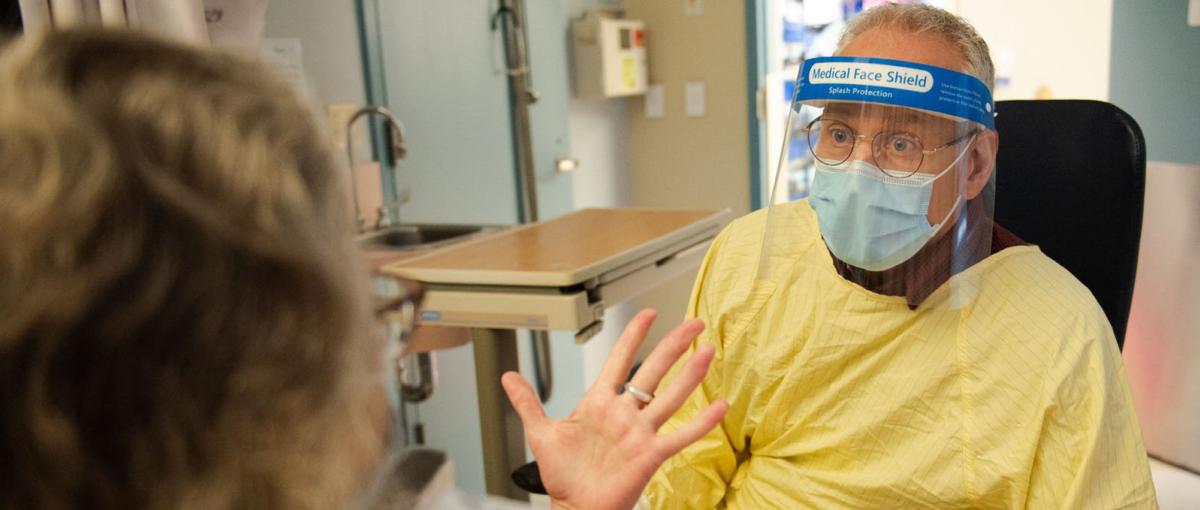The importance of caring for your spirit

August 9, 2021
By Lisa Brunelle, Communications advisor, Covenant Health
Spiritual health is important for our well-being.
“Spiritual health means much more than religion,” says Brian Greenwood, chaplain at the Grey Nuns Community Hospital. “It can be love of a pet or animals, connections to family and friends, spending time in nature, connecting with others or whatever brings the person a sense of meaning and purpose.”
It creates balance between the physical, psychological and social areas of our lives, says Brian. Spiritual health can help us achieve peace and find hope and comfort — even in the hardest times. Challenging life experiences are when spirituality can help us better express emotions and thoughts and find ways to cope with what’s taking place. It helps prevent us from feeling lost, says Brian.
“Everyone has a spirit,” says Brian. “Not everyone has a religion.”
Spiritual care in hospitals
Chaplains can help patients address their spiritual health during their time in hospital. Brian says that spiritual care can support patients regardless of faith tradition. At times, this may include rituals such as prayers, smudges, sacraments and seasonal observations. What he seeks is for the patient to share the most pressing thing on their mind so he can assist them on their healing journey through their spiritual expression. Sometimes simply sitting in silence can be healing.
“Chaplains are trained to listen for the unfathomable gift a person considers sacred, and that may or may not include religion,” says Brian.
Brian says chaplains enter a patient’s space ready to listen to their story — what matters most to them at a specific time. It’s through this expression that people can brainstorm, reframe or access new or old meanings and purposes — these are all spiritual interventions.
“It’s like I go into a patient’s room with a basket,” says Brian. “I put the basket beside the bed, and as the patient begins to talk about what’s most important to them right now, they’re putting pieces into the basket — their sources of spiritual pain and spiritual difficulty. When they have filled the basket with their story, with what is troubling them most currently, they sit back and look at the ceiling and their eyes dart back and forth. I know the next thing that they’re going to say will be their coping mechanism.”
Coping may be family, friends, a pet, prayer to God or a divine presence, nature or something else that is meaningful to them.
“If the patient starts retelling the story, I know they may not recognize their coping mechanisms, and we brainstorm together to come up with some,” says Brian. “Chaplains don’t impose our coping mechanisms on others; we help patients find their own ways of coping. This said, some patients request direct help with existential and theological matters, and this we are trained and equipped to provide.”
Brian says things changed during the pandemic.
“Now, when I walk into a room, the patient often says, ‘Take a seat and sit a spell,’” says Brian. “By the time I’m able to explain who I am, the patient is often well into sharing their story. They’re eager to express themselves, and we chaplains have time and opportunity to bear witness. There is a hunger for compassionate listeners.
“Unlike any other time in my 17 years’ experience as a chaplain, I have never had this kind of appetite from patients to talk with me and express their spiritual pain,” says Brian. “The isolation and loneliness people have been experiencing are driving this desire.”
What you can do for your spiritual health
“Without expressing our inner thoughts and feelings, the human spirit languishes,” says Brian. “Sharing them out loud is powerful. It allows us to hear what we’re experiencing and helps us make meaning and come up with ideas about what we can do to come into alignment with our meaning and purpose. We need someone with whom to share our story.”
If you want to enhance your own spiritual health, find someone you feel safe with to share your inner thoughts and feelings. It can be with family, friends, clergy or mental health supports — in person or online. Journaling can also provide an outlet for your spiritual joy and pain. Doing this can help connect you with what is most meaningful for you.
“Perhaps oversimplified, we seek peace — peace with others, peace with God or a higher power or nature and also peace with ourselves,” says Brian.